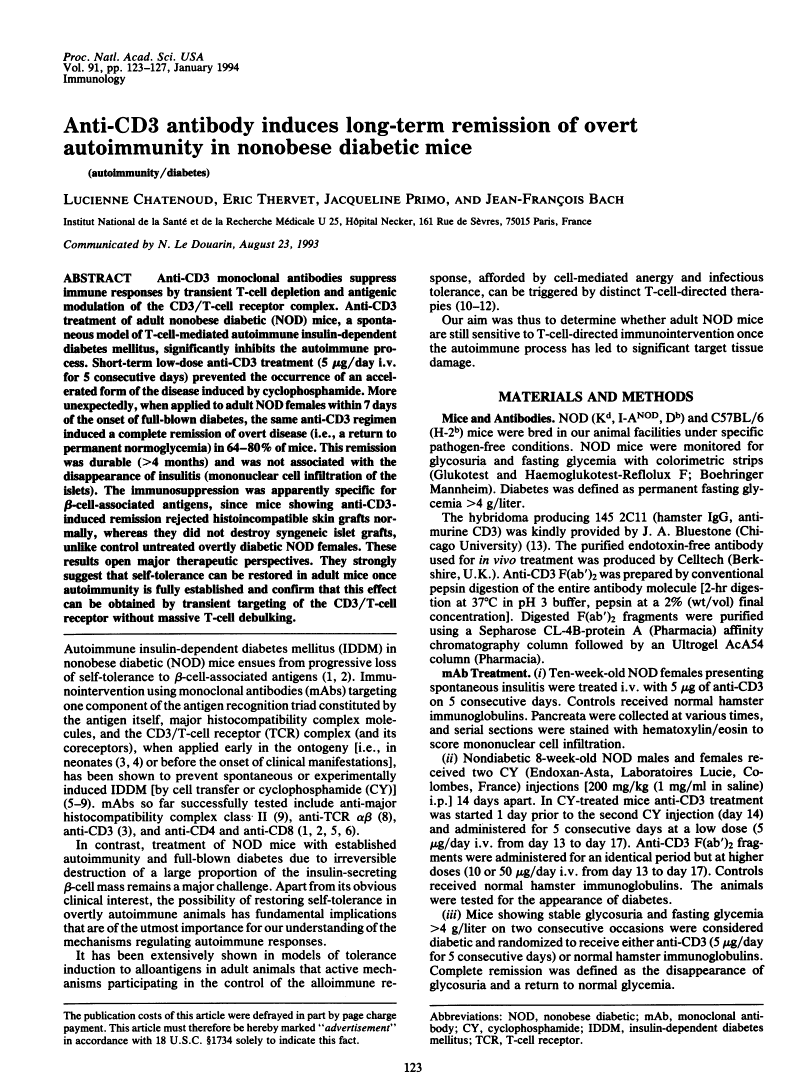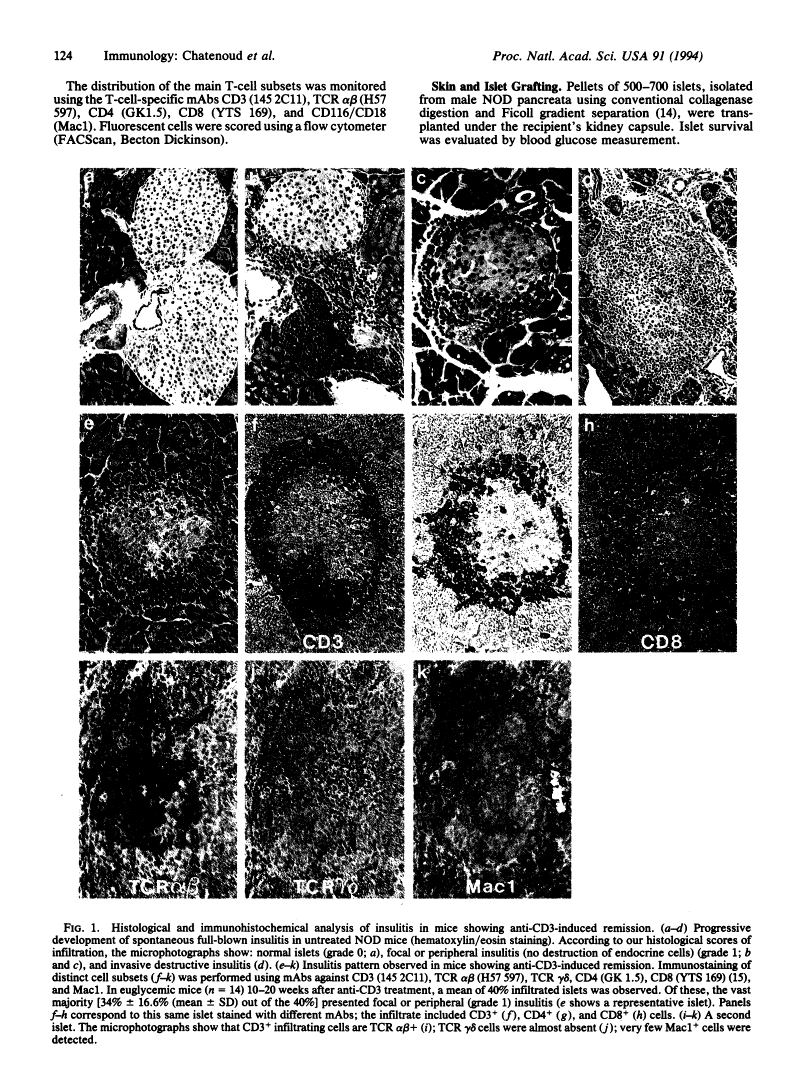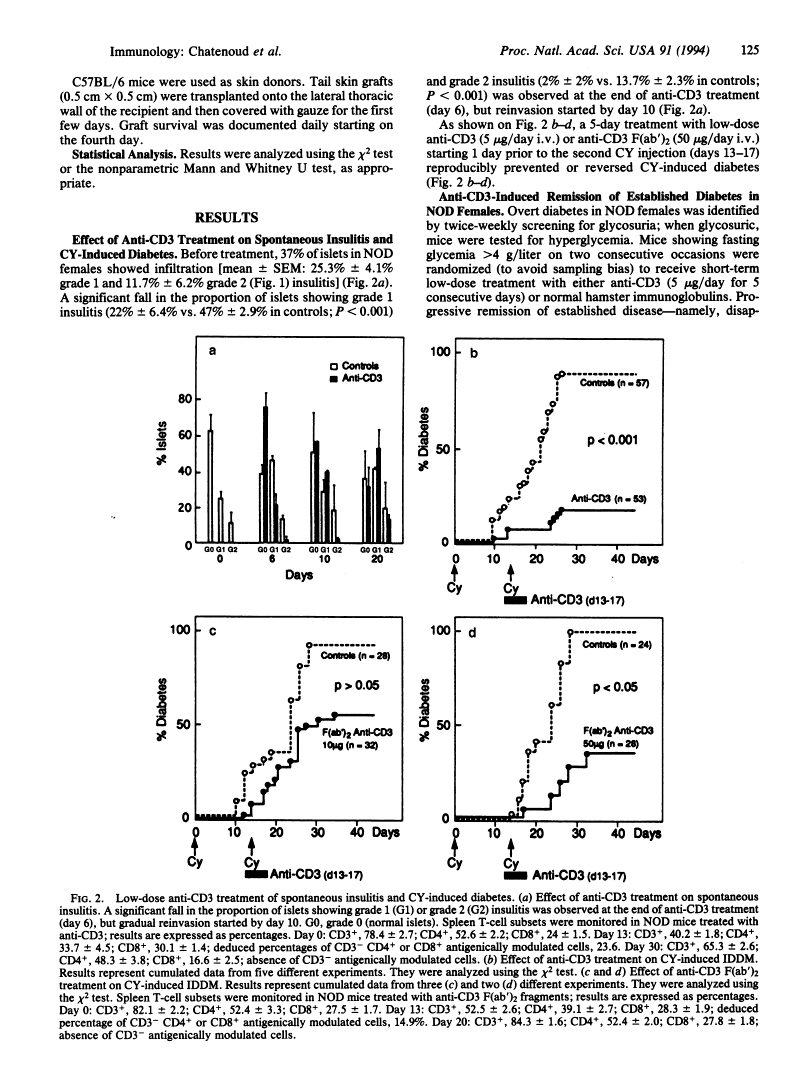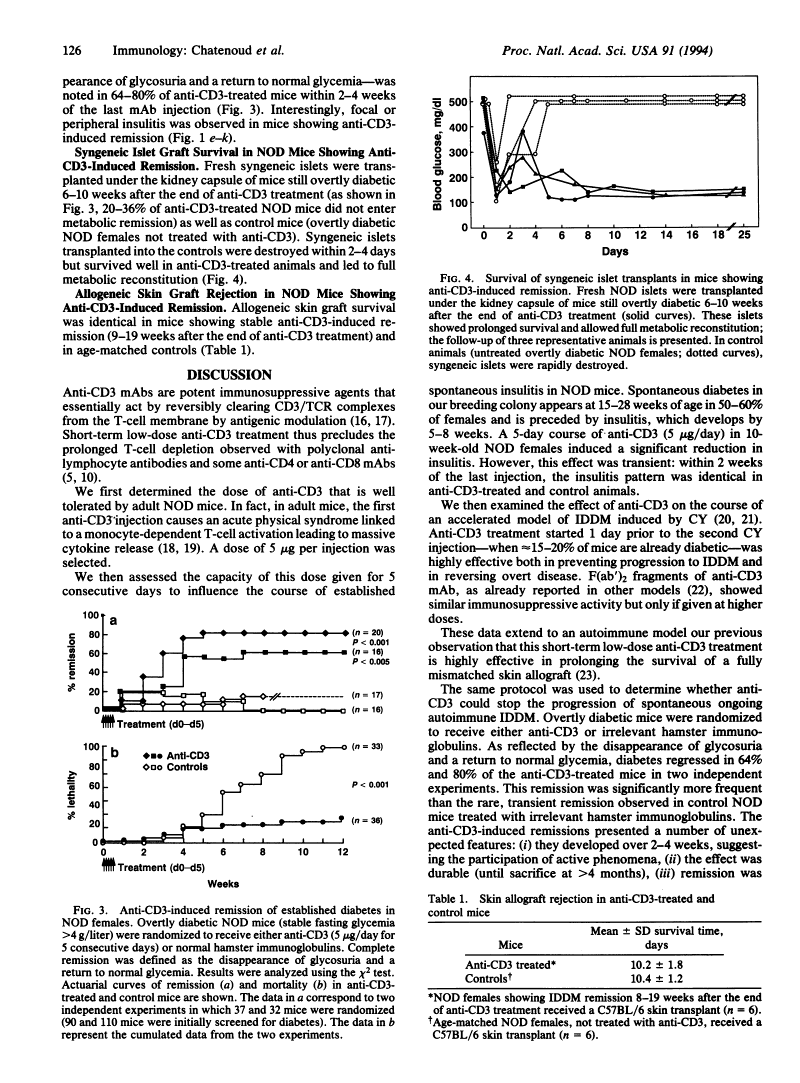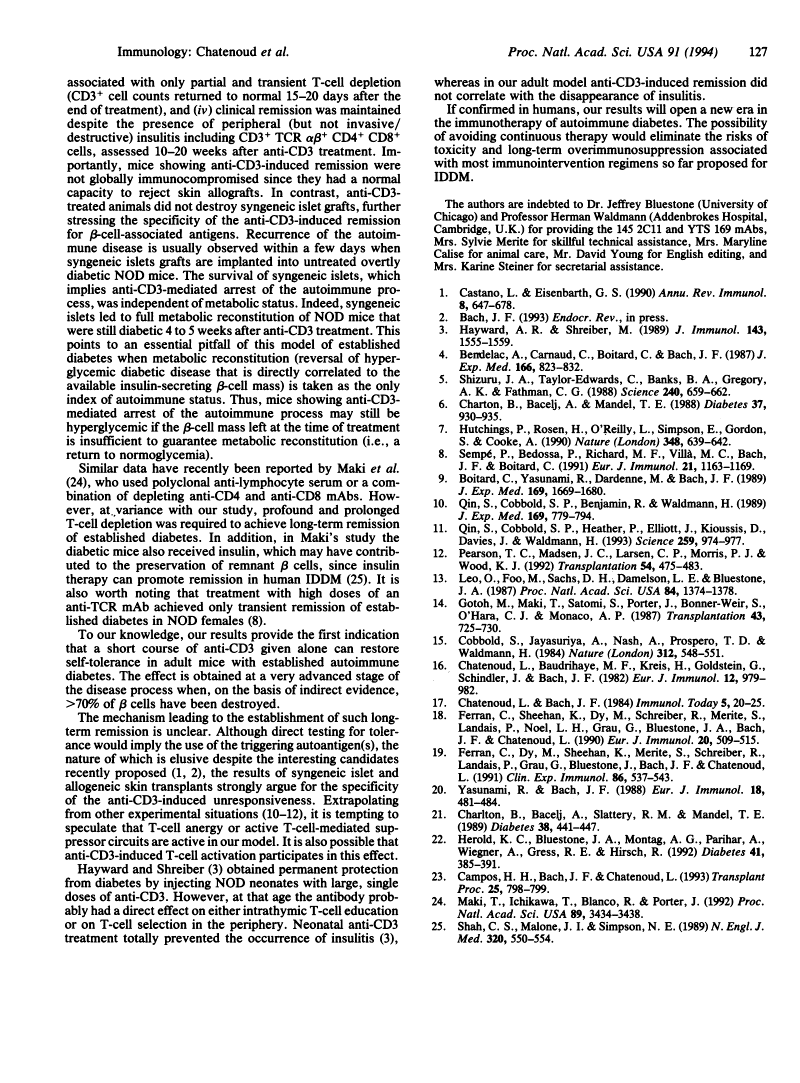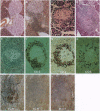Abstract
Free full text

Anti-CD3 antibody induces long-term remission of overt autoimmunity in nonobese diabetic mice.
Abstract
Anti-CD3 monoclonal antibodies suppress immune responses by transient T-cell depletion and antigenic modulation of the CD3/T-cell receptor complex. Anti-CD3 treatment of adult nonobese diabetic (NOD) mice, a spontaneous model of T-cell-mediated autoimmune insulin-dependent diabetes mellitus, significantly inhibits the autoimmune process. Short-term low-dose anti-CD3 treatment (5 micrograms/day i.v. for 5 consecutive days) prevented the occurrence of an accelerated form of the disease induced by cyclophosphamide. More unexpectedly, when applied to adult NOD females within 7 days of the onset of full-blown diabetes, the same anti-CD3 regimen induced a complete remission of overt disease (i.e., a return to permanent normoglycemia) in 64-80% of mice. This remission was durable (> 4 months) and was not associated with the disappearance of insulitis (mononuclear cell infiltration of the islets). The immunosuppression was apparently specific for beta-cell-associated antigens, since mice showing anti-CD3-induced remission rejected histoincompatible skin grafts normally, whereas they did not destroy syngeneic islet grafts, unlike control untreated overtly diabetic NOD females. These results open major therapeutic perspectives. They strongly suggest that self-tolerance can be restored in adult mice once autoimmunity is fully established and confirm that this effect can be obtained by transient targeting of the CD3/T-cell receptor without massive T-cell debulking.
Full text
Full text is available as a scanned copy of the original print version. Get a printable copy (PDF file) of the complete article (1.9M), or click on a page image below to browse page by page. Links to PubMed are also available for Selected References.
Images in this article
Click on the image to see a larger version.
Selected References
These references are in PubMed. This may not be the complete list of references from this article.
- Castaño L, Eisenbarth GS. Type-I diabetes: a chronic autoimmune disease of human, mouse, and rat. Annu Rev Immunol. 1990;8:647–679. [Abstract] [Google Scholar]
- Hayward AR, Shreiber M. Neonatal injection of CD3 antibody into nonobese diabetic mice reduces the incidence of insulitis and diabetes. J Immunol. 1989 Sep 1;143(5):1555–1559. [Abstract] [Google Scholar]
- Bendelac A, Carnaud C, Boitard C, Bach JF. Syngeneic transfer of autoimmune diabetes from diabetic NOD mice to healthy neonates. Requirement for both L3T4+ and Lyt-2+ T cells. J Exp Med. 1987 Oct 1;166(4):823–832. [Europe PMC free article] [Abstract] [Google Scholar]
- Shizuru JA, Taylor-Edwards C, Banks BA, Gregory AK, Fathman CG. Immunotherapy of the nonobese diabetic mouse: treatment with an antibody to T-helper lymphocytes. Science. 1988 Apr 29;240(4852):659–662. [Abstract] [Google Scholar]
- Charlton B, Bacelj A, Mandel TE. Administration of silica particles or anti-Lyt2 antibody prevents beta-cell destruction in NOD mice given cyclophosphamide. Diabetes. 1988 Jul;37(7):930–935. [Abstract] [Google Scholar]
- Hutchings P, Rosen H, O'Reilly L, Simpson E, Gordon S, Cooke A. Transfer of diabetes in mice prevented by blockade of adhesion-promoting receptor on macrophages. Nature. 1990 Dec 13;348(6302):639–642. [Abstract] [Google Scholar]
- Sempé P, Bédossa P, Richard MF, Villà MC, Bach JF, Boitard C. Anti-alpha/beta T cell receptor monoclonal antibody provides an efficient therapy for autoimmune diabetes in nonobese diabetic (NOD) mice. Eur J Immunol. 1991 May;21(5):1163–1169. [Abstract] [Google Scholar]
- Boitard C, Yasunami R, Dardenne M, Bach JF. T cell-mediated inhibition of the transfer of autoimmune diabetes in NOD mice. J Exp Med. 1989 May 1;169(5):1669–1680. [Europe PMC free article] [Abstract] [Google Scholar]
- Qin SX, Cobbold S, Benjamin R, Waldmann H. Induction of classical transplantation tolerance in the adult. J Exp Med. 1989 Mar 1;169(3):779–794. [Europe PMC free article] [Abstract] [Google Scholar]
- Qin S, Cobbold SP, Pope H, Elliott J, Kioussis D, Davies J, Waldmann H. "Infectious" transplantation tolerance. Science. 1993 Feb 12;259(5097):974–977. [Abstract] [Google Scholar]
- Pearson TC, Madsen JC, Larsen CP, Morris PJ, Wood KJ. Induction of transplantation tolerance in adults using donor antigen and anti-CD4 monoclonal antibody. Transplantation. 1992 Sep;54(3):475–483. [Abstract] [Google Scholar]
- Leo O, Foo M, Sachs DH, Samelson LE, Bluestone JA. Identification of a monoclonal antibody specific for a murine T3 polypeptide. Proc Natl Acad Sci U S A. 1987 Mar;84(5):1374–1378. [Europe PMC free article] [Abstract] [Google Scholar]
- Gotoh M, Maki T, Satomi S, Porter J, Bonner-Weir S, O'Hara CJ, Monaco AP. Reproducible high yield of rat islets by stationary in vitro digestion following pancreatic ductal or portal venous collagenase injection. Transplantation. 1987 May;43(5):725–730. [Abstract] [Google Scholar]
- Cobbold SP, Jayasuriya A, Nash A, Prospero TD, Waldmann H. Therapy with monoclonal antibodies by elimination of T-cell subsets in vivo. Nature. 1984 Dec 6;312(5994):548–551. [Abstract] [Google Scholar]
- Chatenoud L, Baudrihaye MF, Kreis H, Goldstein G, Schindler J, Bach JF. Human in vivo antigenic modulation induced by the anti-T cell OKT3 monoclonal antibody. Eur J Immunol. 1982 Nov;12(11):979–982. [Abstract] [Google Scholar]
- Ferran C, Sheehan K, Dy M, Schreiber R, Merite S, Landais P, Noel LH, Grau G, Bluestone J, Bach JF, et al. Cytokine-related syndrome following injection of anti-CD3 monoclonal antibody: further evidence for transient in vivo T cell activation. Eur J Immunol. 1990 Mar;20(3):509–515. [Abstract] [Google Scholar]
- Ferran C, Dy M, Sheehan K, Merite S, Schreiber R, Landais P, Grau G, Bluestone J, Bach JF, Chatenoud L. Inter-mouse strain differences in the in vivo anti-CD3 induced cytokine release. Clin Exp Immunol. 1991 Dec;86(3):537–543. [Abstract] [Google Scholar]
- Yasunami R, Bach JF. Anti-suppressor effect of cyclophosphamide on the development of spontaneous diabetes in NOD mice. Eur J Immunol. 1988 Mar;18(3):481–484. [Abstract] [Google Scholar]
- Charlton B, Bacelj A, Slattery RM, Mandel TE. Cyclophosphamide-induced diabetes in NOD/WEHI mice. Evidence for suppression in spontaneous autoimmune diabetes mellitus. Diabetes. 1989 Apr;38(4):441–447. [Abstract] [Google Scholar]
- Herold KC, Bluestone JA, Montag AG, Parihar A, Wiegner A, Gress RE, Hirsch R. Prevention of autoimmune diabetes with nonactivating anti-CD3 monoclonal antibody. Diabetes. 1992 Mar;41(3):385–391. [Abstract] [Google Scholar]
- Campos HH, Bach JF, Chatenoud L. Devising murine models to better adapt clinical protocols: sequential low-dose treatment with anti-CD3 and anti-CD4 monoclonal antibodies to prevent fully mismatched allograft rejection. Transplant Proc. 1993 Feb;25(1 Pt 1):798–799. [Abstract] [Google Scholar]
- Maki T, Ichikawa T, Blanco R, Porter J. Long-term abrogation of autoimmune diabetes in nonobese diabetic mice by immunotherapy with anti-lymphocyte serum. Proc Natl Acad Sci U S A. 1992 Apr 15;89(8):3434–3438. [Europe PMC free article] [Abstract] [Google Scholar]
- Shah SC, Malone JI, Simpson NE. A randomized trial of intensive insulin therapy in newly diagnosed insulin-dependent diabetes mellitus. N Engl J Med. 1989 Mar 2;320(9):550–554. [Abstract] [Google Scholar]
Associated Data
Articles from Proceedings of the National Academy of Sciences of the United States of America are provided here courtesy of National Academy of Sciences
Full text links
Read article at publisher's site: https://doi.org/10.1073/pnas.91.1.123
Read article for free, from open access legal sources, via Unpaywall:
http://www.pnas.org/content/91/1/123.full.pdf
Citations & impact
Impact metrics
Citations of article over time
Alternative metrics
Smart citations by scite.ai
Explore citation contexts and check if this article has been
supported or disputed.
https://scite.ai/reports/10.1073/pnas.91.1.123
Article citations
Cell-Surface ZnT8 Antibody Prevents and Reverses Autoimmune Diabetes in Mice.
Diabetes, 73(5):806-818, 01 May 2024
Cited by: 2 articles | PMID: 38387059
TCF1highPD-1+Ly108+CD8+ T Cells Are Associated with Graft Preservation in Sensitized Mice Treated with Non-Fc Receptor-Binding CD3 Antibodies.
Immunohorizons, 8(4):295-306, 01 Apr 2024
Cited by: 0 articles | PMID: 38587418 | PMCID: PMC11066723
Diabetes treatment by conversion of gut epithelial cells to insulin-producing cells.
J Diabetes Investig, 15(7):797-804, 01 Mar 2024
Cited by: 0 articles | PMID: 38426644 | PMCID: PMC11215681
Review Free full text in Europe PMC
The immunology of type 1 diabetes.
Nat Rev Immunol, 24(6):435-451, 02 Feb 2024
Cited by: 11 articles | PMID: 38308004
Review
Rational Engineering of Islet Tolerance via Biomaterial-Mediated Immune Modulation.
J Immunol, 212(2):216-224, 01 Jan 2024
Cited by: 1 article | PMID: 38166244
Review
Go to all (405) article citations
Data
Similar Articles
To arrive at the top five similar articles we use a word-weighted algorithm to compare words from the Title and Abstract of each citation.
Remission and pancreas isograft survival in recent onset diabetic NOD mice after treatment with low-dose anti-CD3 monoclonal antibodies.
Transpl Immunol, 10(1):63-72, 01 Jun 2002
Cited by: 21 articles | PMID: 12182467
Nondepleting anti-CD4 and soluble interleukin-1 receptor prevent autoimmune destruction of syngeneic islet grafts in diabetic NOD mice.
Transplantation, 74(5):611-619, 01 Sep 2002
Cited by: 18 articles | PMID: 12352875
Long-term abrogation of autoimmune diabetes in nonobese diabetic mice by immunotherapy with anti-lymphocyte serum.
Proc Natl Acad Sci U S A, 89(8):3434-3438, 01 Apr 1992
Cited by: 67 articles | PMID: 1565635 | PMCID: PMC48882
CD3 antibody treatment stimulates the functional capability of regulatory T cells.
Novartis Found Symp, 252:279-86; discussion 286-90, 01 Jan 2003
Cited by: 18 articles | PMID: 14609225
Review
